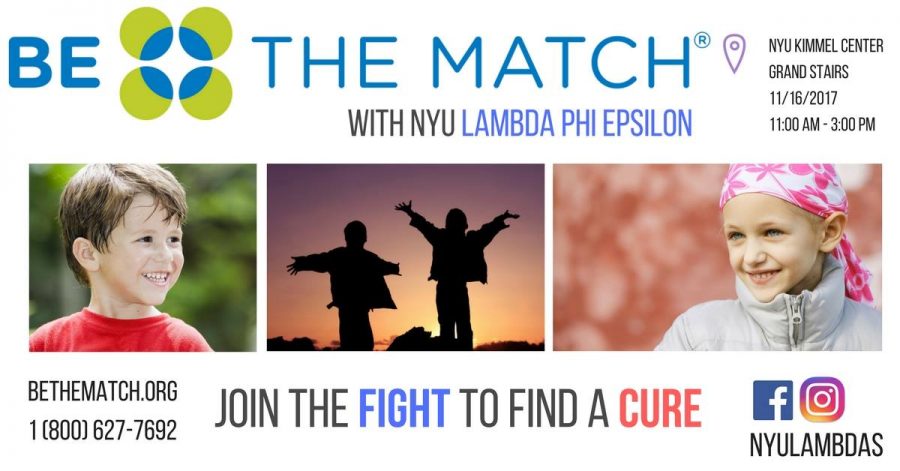Not Your Average Bake Sale: NYU Frat Hosts Bone Marrow Drive
On Nov. 16 NYU fraternity Lambda Phi Epsilon held a bone marrow drive to get NYU students to sign up as potential donors for those in need.
November 17, 2017
On Nov. 16, NYU fraternity Lambda Phi Epsilon hosted a bone marrow drive registration event in partnership with the Be The Match Foundation in Kimmel Center for University Life.
The event allowed any NYU students over 18 to register as blood marrow donors. As donors, students can be called to donate blood or bone marrow to a patient with a life-threatening blood cancer.
President of Lambda Phi Epsilon Eric Chen explained why his fraternity decided to host this event.
“The idea of this event was to find people who are potential matches so they can donate their bone marrow to people who need marrow transplants,” Chen said. “These people are usually suffering from leukemia or lymphoma. In the past, getting these matches to donate bone marrow was very hard to find.”
Lauren Wollney, a community engagement representative of the Icla Silva Foundation, which serves as the recruitment center for Be The Match, helped administer the event and discussed the importance of finding bone marrow donors.
According to Wollney, selected bone marrow donors seeking to register are given a blood test and a physical exam to confirm that they are healthy, and potential donors proceed to attend an information session. Seventy five percent of the time, blood stem cells are requested instead of bone marrow.
“Bone marrow extractions, which usually take four to six hours, are only requested if a donor matches to an an infant, child or someone with a rare disease,” Wollney said.
Transportation and insurance is paid for by Be The Match according to Wollney, and donors can typically walk out of the hospital the same day of the transplant.
“Anyone who has leukemia, lymphoma, sickle cell, any blood cancer can be treated and cured by someone donating using peripheral blood stem cells or bone marrow,” Wollney said. “What we ask people to do at bone marrow drives is to simply fill out a form and swab their cheek. What that does is it adds donors to the registry to see if they can match.”
According to Wollney, taking a swab sample takes less than three minutes, and afterwards the sample is tested to match the tissue cell to another patient who needs a donor. If a compatible match is found, donors will receive a call requesting them to donate.
For the Icla Da Silva Foundation, diversifying the pool of donors is essential to finding matches for bone marrow transplants, as those who share a similar ancestry are more likely to match with one another.
Wollney emphasized the rarity of finding a perfect tissue match with an afflicted patient.
“There are millions and millions of tissue types, so that’s why you could sign up and never get a call,” Wollney said. “If you do get a call for someone, you are literally that needle in the haystack, you could literally save someone’s life.”
Email Alesha Bradford at [email protected].
























































































































































